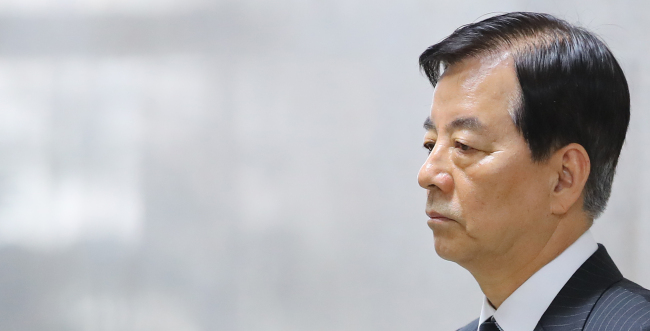South Korea and Japan on Monday tentatively signed a much-disputed bilateral security cooperation agreement, despite expected political backlash.
Officials from Seoul’s Defense Ministry met with their Japanese counterparts in Tokyo for the third working-level meeting for the General Security of Military Information Agreement between the two countries, where they put the finishing touches on the deal.
“South Korea and Japan confirmed that they share the view concerning the ongoing negotiations about the (GSOMIA) draft, and provisionally inked the deal,” the ministry said.
South Korean Defense Minister Han Min-koo and ministry officials have stressed the necessity of signing the Seoul-Tokyo agreement, which is designed to enable information exchange between the two countries in light of the growing nuclear and missile threats from North Korea.
In 2016, Pyongyang conducted two nuclear tests and test-fired over 20 missiles including its first successful launch of the intermediate-range Musudan and a submarine-launched KN-11.
The ministry has been emphasizing the benefits South Korea will gain from Japan’s superior intelligence assets, namely its six Aegis destroyers, advanced radar technology and numerous anti-submarine reconnaissance equipment.
The two countries have been indirectly sharing information via the Trilateral Information Sharing Arrangement signed by South Korea, the US and Japan in 2014. But military officials have cited the need for faster and more direct exchange of information.
Seoul had tried to clinch the deal in 2012 under the previous Lee Myung-bak administration, but the efforts had fallen through amid public backlash that stemmed from the country’s sour relationship with Japan over history and its claim over the Korean islets of Dokdo.
The renewed attempt to sign the deal, however, has also been facing criticism that the ministry is trying to rush an agreement that the majority of the public opposes.
A survey by local pollster Real Meter last month showed that 15.8 percent of respondents agree with the deal, while 47.9 percent are against it. Minister Han said the ministry did not conduct a separate poll on the issue.
Han had told Parliament last month that while the deal was essential from a military standpoint, it was important to get the public’s consent due to the “unique” relationship between South Korea and Japan.
“I never meant that the public consent was a precondition to (the GSOMIA),” he said.
“There are many cases in which the government fails to explain to people sufficiently about its deals and the public ends up rejecting it. ... But in many cases, it turns out that (the deal) was necessary despite the public opposition.”
While the ministry has vowed to collect public opinion on the matter as part of the remaining process, Han stated that he is “not considering scrapping the deal” in spite of the public backlash, indicating that the government will push forward with the contentious agreement.
The process has sparked criticism as it demonstrated what appears to be a flip-flop of the ministry’s stance on the significance of public sentiment toward Japan.
After facing major public outcry in 2012, the ministry had consistently said that it would not push ahead with the military information agreement if the majority of the public retains ill-natured feelings toward Japan. Such sentiment was fueled by last year’s controversial deal over South Korean women sexually enslaved during World War II.
But the ministry on Oct. 27 announced the resumption of negotiations for the military information agreement, although there had been no indication that public sentiment had changed. It moved toward tentative signing less than three weeks later.
“The ministry’s stance is that the political issue and security issue should be separate,” said a high-ranking ministry official.
The seemingly rushed process has sparked speculation that South Korea has been pressured by outside parties to complete the deal, namely by the US which has been looking to boost trilateral military alliance in the region. Fueling such speculation was the timing of the ministry’s announcement, which was merely a week after the Security Consultative Meeting between the allies.
Han said that the meeting did not touch on the matter, nor was it related to Seoul’s integration into the US-led missile defense system.
The prospect of the missile defense system in East Asia has been irking South Korea’s powerful neighbors, particularly Washington’s biggest rival China.
The minster also denied rumors that the government was pushing to clinch the deal while the public is preoccupied with the scandal involving President Park Geun-hye’s confidante Choi Soon-sil.
“We’ve never imagine taking advantage of the confusion. ... But we cannot allow (the Choi incident) to hold us back,” he said, stressing that the related government bodies had been discussing the matter well before the scandal.
Opposition lawmakers said they will try to oust Han if a tentative signing does take place.
The main opposition Democratic Party of Korea said via a statement that the party will attempt all possible ways to nullify the agreement.
Park Jie-won, the interim leader of the minor opposition People’s Party, said that his party and the minor opposition Justice Party will join the Democratic Party in recommending the dismissal of Han.
Democratic Party floor leader Woo Sang-ho said that he wonders if the Defense Ministry has “lost its mind,” adding that the massive anti-government protest Saturday represented people’s fury against Park administration and its methods.
“They were furious against Park’s unilateral ways and called for a fundamental change, how can (the ministry) say it will push ahead with a deal that the people clearly objects?” he said at a Supreme Council session of his party.
By Yoon Min-sik (
minsikyoon@heraldcorp.com)




![[Herald Interview] 'Trump will use tariffs as first line of defense for American manufacturing'](http://res.heraldm.com/phpwas/restmb_idxmake.php?idx=644&simg=/content/image/2024/11/26/20241126050017_0.jpg)


![[Health and care] Getting cancer young: Why cancer isn’t just an older person’s battle](http://res.heraldm.com/phpwas/restmb_idxmake.php?idx=644&simg=/content/image/2024/11/26/20241126050043_0.jpg)
